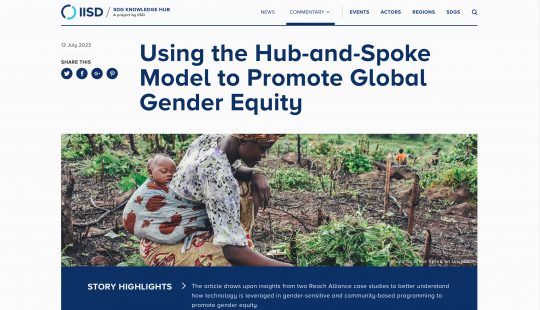
Zimbabwe
Africaid’s Zvandiri: Peer Support Interventions for Young Mothers Living with HIV
- Status
- Completed Research
- Research Year
- 2021-22
Sub-Saharan Africa accounts for two-thirds of people living with HIV globally. Youth in the region, particularly young women and girls, are disproportionately vulnerable to the virus because of associated stigmas and limitations in testing and treatment access. Zvandiri, a nonprofit program run by Africaid, was created in 2004 as a response to this issue. The initiative connects youth living with HIV to trained counsellors also living with HIV. Through peer-support initiatives, these Community Adolescent Treatment Supporters (CATS) improve access to HIV testing and treatment while also providing mental health support to other youth living with HIV in their communities. Their holistic and peer-based approach is the linchpin to Zvandiri’s success. The organization has expanded to nine African countries with 1,600 CATS supporting 56,000 youths. They aim to expand their model to 20 countries by 2030 and reach 1 million youth living with HIV.
This report examines the operations of Zvandiri’s Young Mentor Mother (YMM) program. All its mentors and clients are young mothers living with HIV. The report also explores how these more specific shared experiences affect the YMM model’s efficacy, as well as the challenges and successes that it has faced in bolstering young mothers’ access to HIV testing and treatment. Since the YMM program has been implemented in only parts of Zimbabwe thus far, the report focuses on the potential for scaling the program to other regions and countries in Sub-Saharan Africa.
Researchers
-

-

University of Toronto
Syeda Hasan
-

University of Toronto
Sharon Low
-

Mentors
-

University of Toronto
Carmen Logie
Canada Research Chair in Global Health Equity and Social Justice with Marginalized Populations, Associate Professor at the Factor-Inwentash Faculty of Social Work, University of Toronto, Adjunct Professor at the United Nations University Institute for Water, Environment, & Health, and Adjunct Scientist at Women’s College Hospital
Related Information
-

-

Health Promotion Practice
Bolstering Access to HIV-Related Health care in Zimbabwe Among Young Mothers Living With HIV: Lessons Learned on HIV Health Promotion From Zvandiri’s Young Mentor Mother Program

